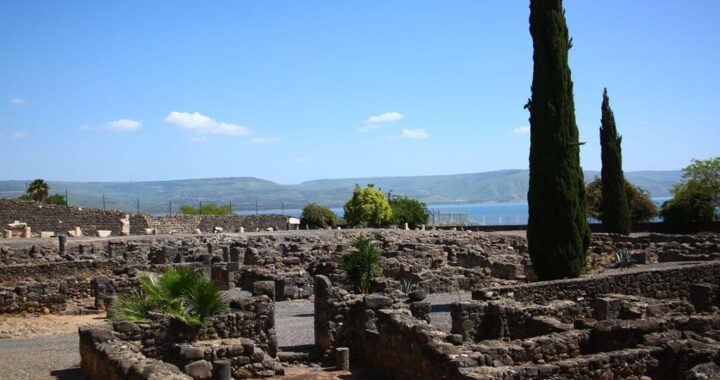Isa 44:28:
That saith of Cyrus, He is my shepherd, and shall perform all my pleasure: even saying to Jerusalem, Thou shalt be built; and to the temple, Thy foundation shall be laid.
Isa 45:1:
Thus saith the LORD to his anointed, to Cyrus, whose right hand I have holden, to subdue nations before him; and I will loose the loins of kings, to open before him the two leaved gates; and the gates shall not be shut;
Introduction:
Imagine in 1830 that someone in the then 54-year-old United States of America predicted by name in writing that a future president, who himself had formerly been a Hollywood actor, would be instrumental in ending the Cold War with the Soviet Union some 150 years later—in the 1980s! What do you suppose the people back in the early 19th century would have thought? Perhaps their first questions would be:
- “What’s a Cold War?”
- “What’s a Soviet Union?”
- “What’s Hollywood?”
- And then, “How could an actor be elected president?”
The very idea would sound so fantastical as to be ridiculed. The reaction for those in the 21st century upon hearing such a written claim would be extreme skepticism as well: “No one could do that; the document was forged.”
Something similar to the above made-up scenario did happen in the Old Testament book of Isaiah. The prophet Isaiah predicted a king named Cyrus would allow the Jewish exiles to return to the Promised Land. There are so many “impossible” aspects to this prediction that a person could only conclude that the Bible is God’s Holy Word, or that this story gives evidence that the Bible makes fraudulent claims.
We are going to see that Isaiah’s miraculous prediction of the Persian King Cyrus’ granting the exiled Jewish people release from captivity (Isaiah 44-45) provides the believer assurance that God’s Word is trustworthy. To accomplish this, we will explore the following significances: of the prophecy’s context, of King Cyrus, of the prophecy itself, of the timeline, and of the implications to Bible believers today.
The Significance of the Prophecy’s Context
Isaiah wrote the prophetic book which bears his name starting with the reign of King Uzziah (Is. 6.1), who died in 739 B.C. He continued his prophetic ministry to at least 681 B.C., when the Assyrian king Sennacherib died in 681 B.C. (described in Is. 37:38). During that time, he wrote the prophecy concerning Cyrus in Is. 44:28- 45.1. Conservative scholars estimate Isaiah wrote the prophecy some 150 years before its fulfillment in 538 B.C.
That time in Judah’s history (739 to 681 B.C.) witnessed the decline and downfall of the Northern Kingdom which was conquered and deported within the Assyrian Empire in 722 B.C. It was the Assyrian Empire, not the later (and shorter-lived) neo-Babylonian Empire, who were the terror in the minds of lesser kingdoms in Isaiah’s day. The Persian Empire was not really on anyone’s radar during that time.
The Significance of the King
Ezra 1:1-4 mentions Persian King Cyrus allowing the Jewish people to return to their own land. It was a reversal of the Assyrian strategy of exiling conquered peoples to other parts of the Empire to prevent revolts.
Cyrus’ motivations for changing the policy reveals his desire to establish loyal buffer states around him and had religious overtones as well: The famous Cyrus Cylinder (538 B.C.), which records his [Cyrus’] capture of Babylon and his program of repatriating his subject peoples in their homelands, includes this statement: “May all the gods whom I have resettled in their sacred cities daily ask Bel and Nebo for a long life for me.” 1
The Significance of the Prophecy
The Jewish people living in Isaiah’s day were witnesses of God’s clear judgment on the Northern Kingdom resulting in their exile to a foreign land. Some of them must have been concerned about the spiritual state of their own Southern Kingdom centered in Jerusalem and its growing idolatry.
Though the worship of the true God took place in the Temple, there were those in the Southern Kingdom wgi were aware of the shortcomings of the people in their dedication to God. While some in the Jerusalem orbit might have taken security in the assumption that God would never allow His Temple to be overrun by Gentile infidels, others realized from the messages of prophets like Isaiah and later Micah that God would not tolerate their sin forever. These prophets had predicted Jerusalem’s fall and the Temple’s destruction.
However, from the Cyrus prophecy, they could take comfort that God’s promises of His coming kingdom would not be forgotten. Though Jerusalem would fall, at some point the kingdom prophecy would be fulfilled. Jerusalem and the Temple (both very much in operation during Isaiah’s time), would be rebuilt after a time of destruction and desolation (Is. 44.28).
Further, the prophecy goes on to state that Cyrus, God’s “anointed,” would not only free the Jewish people, but also to subdue the nations that had oppressed them (Is. 45.1-2).
Does the prophecy sound fantastical? The context of these verses give evidence of God’s power that should quiet the doubters. Just after the prophecy, God declares through Isaiah (45.5-7):
For Jacob my servant’s sake, and Israel mine elect, I have even called thee by thy name: I have surnamed thee, though thou hast not known me.
I am the LORD, and there is none else, there is no God beside me: I girded thee, though thou hast not known me:
That they may know from the rising of the sun, and from the west, that there is none beside me. I am the LORD, and there is none else.
I form the light, and create darkness: I make peace, and create evil: I the LORD do all these things.
God identifies the object of His concern, calling Israel His elect. The context allows no mistaking or substitution of whom are the objects of His declarations. 2 The previous chapter also speaks of God’s exclusivity and power (Isaiah 44.6-8):
Thus saith the LORD the King of Israel, and his redeemer the LORD of hosts; I am the first, and I am the last; and beside me there is no God.
And who, as I, shall call, and shall declare it, and set it in order for me, since I appointed the ancient people? and the things that are coming, and shall come, let them shew unto them.
Fear ye not, neither be afraid: have not I told thee from that time, and have declared it? ye are even my witnesses. Is there a God beside me? yea, there is no God; I know not any.
Do we dare doubt God? Can He predict the future years in advance through His prophets? This prophecy declares to us in no uncertain terms that our choice is to believe His Word.
Higher critical scholars can only resort to the claim that the prophecy was a forgery, written after the events. This prophecy contributes to the fact that liberal scholars believe there were two or even three authors of this book, contrary to the Bible’s claims.
The Significance of the Timeline
- 681 B.C. Isaiah wrote the Cyrus prophecy before this date.
- 612 B.C. The mighty Assyrian Empire was defeated by Babylon.
- c. 605 B.C. Jeremiah’s prediction (Jer. 25.1, 11-12) that Judah would be exiled for 70 years. 3
- 586 B.C. Nebuchadnezzar captured Jerusalem and carries the captives to Babylon.
- 559 B.C. Cyrus, founder of the Persian Empire, came to the throne and reigned until his death in 530 B.C. 4
- 550/549 B.C. Cyrus defeated the Medes and becomes ruler of the Persian and Median Empire.
- 547-546 B.C. Cyrus conquered Lydia and Anatolia.
- 539 B.C. Cyrus defeated the Babylonian Empire.
- 538 B.C. Cyrus decreed the Jews could return to Jerusalem and rebuild the Temple. (2 Chron. 36:22–23; Ezra 1:1–4). 5
The timeline clearly shows that since the Bible is correct, it could only be a miraculous prediction. Within the Isaiah’s lifetime, Assyria was the dominant empire. No one could have foreseen their defeat by the upstart Babylonians in 612 B.C. Further, the quick demise of the Babylonian Empire (in one night) in 539 B.C. with the resulting new powerful Persian Empire demonstrates that world-changing events can happen very quickly. 6
The Significance of the Implications
What implications and applications did these verses have for those who read them in Isaiah’s time? And what significance did they have for those who would suffer during the exile?
To the former group:
- God had a plan and purpose (though a difficult one) for sending His people into exile.
- God would not abandon His chosen beloved people—the Jews. His commitment to them was not based on their good works. God’s steadfast love to His people was based on His grace.
To the latter group:
- God had not abandoned His people. Though many of them had witnessed the unthinkable—the Jerusalem Temple’s destruction—God would allow the Jewish people to return and rebuild it. What an encouragement this was not just for the exiles, but also for their descendants during their 70-year exile.
- God’s promises to Israel were dependent on Him keeping His word to them.
What about for believers today? Is there any lesson or encouragement that might help us? I think there is. First, because the God we worship is the same God of the Israelites. His faithfulness to us is also based on grace, not on our works. What He has revealed in His Word for our future (what we call the “End Times”), we can believe will happen as He said.
Why? Because we have a God that is all-knowing and all-powerful. He can and did make the most inconceivable of predictions that actually took place. What an encouragement it is to know that our Lord God has great plans for us and the power to bring them to pass.
Works Cited- John A. Martin, “Ezra,” in The Bible Knowledge Commentary: An Exposition of the Scriptures, ed. J. F. Walvoord and R. B. Zuck, vol. 1 (Wheaton, IL: Victor Books, 1985), 654.[↩]
- There are those who might want to substitute the “church” here instead of Israel. But that would violate literal interpretation and is completely foreign to the context.[↩]
- For dating, see the discussing in Charles L. Feinberg, “Jeremiah,” in The Expositor’s Bible Commentary: Isaiah, Jeremiah, Lamentations, Ezekiel, ed. Frank E. Gaebelein, vol. 6 (Grand Rapids, MI: Zondervan Publishing House, 1986), 530.[↩]
- The dates from Cyrus’ activities come from Edwin Yamauchi, “Ezra-Nehemiah,” in The Expositor’s Bible Commentary: 1 & 2 Kings, 1 & 2 Chronicles, Ezra, Nehemiah, Esther, Job, vol. 4, 601.[↩]
- John A. Martin, “Isaiah,” in The Bible Knowledge Commentary, 1099.[↩]
- Another example would be the rapid fall of the Soviet Union in the early 1990s.[↩]

Dr. Ken Rathbun
Ken Rathbun (PhD, University of the West Indies) was a Baptist Mid-Missions missionary in Jamaica from 2002–16. He has preached and taught in many areas of the world and has served as vice president for Academic Services and dean at Faith Baptist Bible College and Theological Seminary since 2016. He and his wife, Cléa, have two young children.

Dr. Ken Rathbun
Ken Rathbun (PhD, University of the West Indies) was a Baptist Mid-Missions missionary in Jamaica from 2002–16. He has preached and taught in many areas of the world and has served as vice president for Academic Services and dean at Faith Baptist Bible College and Theological Seminary since 2016. He and his wife, Cléa, have two young children.




What a great exposition of the fantastic nature of an omnipotent God! Only the Alpha and Omega could do this!
Beautiful of understanding
Fascinating and faith-building this article unpacks Isaiah’s prophecy of King Cyrus with clarity and depth, showcasing God’s sovereignty over history and His power to use unexpected leaders for divine purposes.
Gostei muito deste comentário bíblico, e gostaria de receber esse comentário em meu e-mail pois me ajudaria muito em um estudo bíblico que estou trazendo para a igreja a qual tenho a honra de pastorear. Estou falando sobre o avivamento trazido para Israel através do Rei Josias, que era uma promessa de Deus cerca de 300 anos antes, vaticinada pelo o homem de Deus de Judá que veio a Betel, por ocasião do reinado de Jeroboão filho de Nebate. Achei pertinente introduzir o acontecimento envolvendo Ciro, anunciado pelo profeta Isaías, cerca de 150 anos antes dos fatos virem à tona.